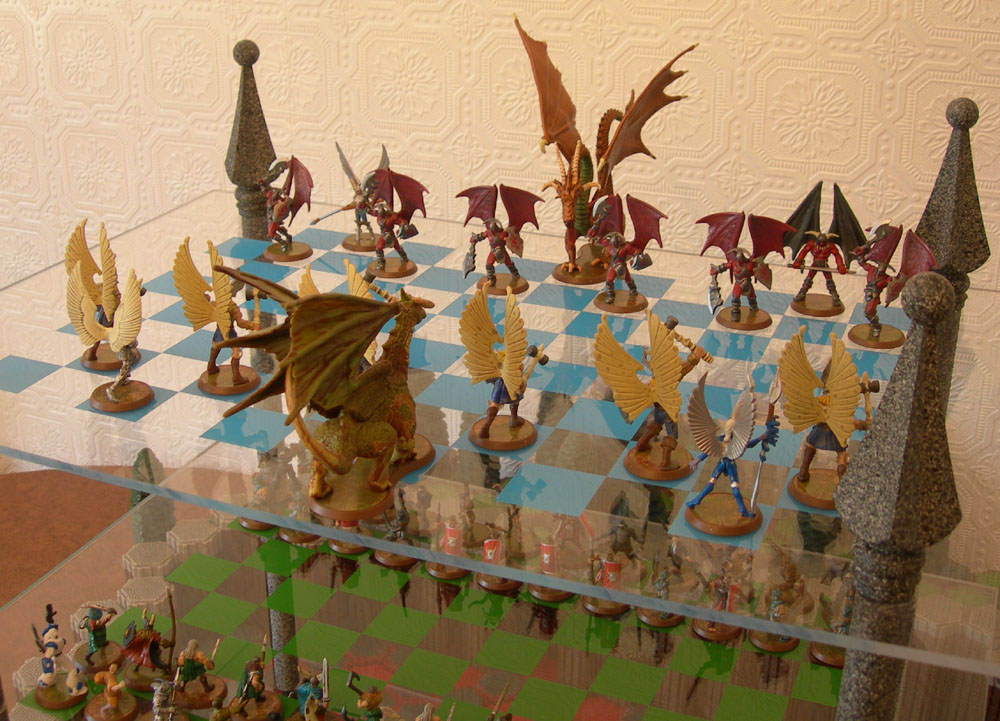This blog is the second in a series inspired by Michael Witwer’s Empire of Imagination: Gary Gygax and the Birth of DUNGEONS & DRAGONS.
You might be surprised to learn that Gary Gygax played games other than Dungeons & Dragons. While he certainly enjoyed D&D, he was an avid chess player and war-gamer. And, of course, he always had new games brewing in the back of his mind.

One of Gary’s creations, Dragonchess (Photo credit: Zac Dortch)
While consistency is certainly key for a gaming group, some level of variety is necessary to keep players interested. You need to swap out GMs from time-to-time. Different games on the table keep people interested. Even a change in locale can spice things up a bit (hosting can get tiresome too!).
So by way of recommendation, here are the top six games that I think should grace your tabletop, if not as a permanent fixture, then as an occasional change of pace:
6. Chess
85% of you will read this and think I’ve lost my mind. Really? Chess makes the cut? Well, yes it does and here’s why: I’m astonished by the number of people who really have not played chess. Yeah, they played with their grandparent a few times. That’s not what I’m talking about.
Really playing chess looks like getting your brains beat out over and over again as an adult, until you start learning the real strategy. Chess is an excellent, deep, and timeless game. If you’ve never invested time in chess, find somebody who has played a lot and have them show you the ropes.
5. Diplomacy
Alright, now I really must be pulling your leg. Surely the Mad Cleric wouldn’t recommend this devastator of friendships! But yes I am…with a strong, all caps caveat:
SET CLEAR EXPECTATIONS UP FRONT WHEN PLAYING WITH FRIENDS!
That is, make sure all players expect the others to lie, betray, backstab, and generally act wretched. Why’s that? Because Diplomacy is about real politics and real politics is morally bankrupt. In Diplomacy, you’re angling for world domination (kind of like Risk). But instead of rolling dice, you’re cutting deals away from the table with other players for support and alliances. More happens away from the table than at the table in this game. In the end, you return to the table only to see the lies exposed.
It’s vicious. It’s fun. And occasionally, you’ll feel slightly guilty afterwards. Also, it was the favorite game of JFK and Henry Kissinger. So that’s something.
4. Mouse Guard RPG, 2nd Edition
You can look forward to a full review of the 2nd Edition of Mouse Guard from me in the near future. That said, what is Mouse Guard?
Mouse Guard is an RPG about being a guardsmouse–an anthropomorphic mouse that is part of a knightly band called the Mouse Guard, who protects mice from whatever may threaten them. I have yet to play the 2nd Edition, but it’s very clearly a cleaned up version of the first edition. 1st Ed. was a blast, but it definitely had some wonky issues that needed some tidying.
What sets this game apart is not only its setting (which started as a comic book), but also its quick pace. Every game I’ve played moves very quickly, rarely getting cramped by combat or rules issues. Combat is very unique, encouraging players to plan and work together as a team, rather than every individual making choices for themselves. As a GM, I found it very challenging and exciting to see what the players came up with. Plus, the mice are just cute.
3. AD&D, First Edition
You knew this one had to make my list. If you haven’t played it, I feel like you’ve been cheated. It’s not the game that started them all (that would be OD&D…or even Chainmail if you wanted to get testy), but it’s the first truly complete Dungeons & Dragons experience.
AD&D will challenge your players immensely. It will force GMs to go back to basics of quest and combat design. And here’s what I tell everyone who asks me about my experience: yes, AD&D is wonky. But it’s fun and it makes sense. Whatever may be wonky makes sense within the system.
When I’m playing AD&D, I feel like I’m participating in something primal, raw, and pure. Sure, Gygax felt his Lejendary Adventure was a better game. In the end, AD&D will always be his magnum opus. And it’s a fun one at that.
2. FIASCO
FIASCO is a narrative-focused, rules-light roleplaying game inspired by the dark comedic films of the Coen brothers. I love this game for about a million reasons. First, there’s no GM and no preparation. So how do you play? First you choose a (usually free) playset that gives the setting in which you’re playing. Then by rolling d6s, each player character and the relationships between them are determined.
Gameplay consists of two acts. In the first act, PCs are preparing for some eventual goal in the second act. But between the two acts, a twist is introduced to the story that generally ruins everyone’s plans. In the end, most of my FIASCO games have ended with most or all PCs dying ingloriously, as a result of power-mongering, greed, and general meanness. Think Fargo or Burn Without Reading. It’s heinous, it’s hilarious, and it’s really dang fun. Perfect for a random game night when your group’s not big enough.
1. Star Wars Roleplaying Game (FFG)
Next to D&D 4e, this is the RPG that I’ve played the most. There are a lot of things that I love about this system–but the most important part is, of course, the narrative dice system. Rather than using typical numeric dice, the dice have symbols that direct the flow of narrative. Sounds confusing, but it isn’t. In fact, I’m working on a little project right now that will teach you the game lickety-split!
If you love Star Wars, you’ll love this game. One thing that’s a blast about it is that players have almost as much influence on the game world as the GM does. They have remarkable freedom to shape the world and the narrative, using those narrative dice (as well as the power of the Force). If you’re tired of the GM running the show, this is a great change of pace.
So there you go. My top six recommendations for spicing up your gaming table! Which have I left off the list? Chime in on the Mad Cleric Facebook page!
Disclosure of Material Connection: the links in the post above are “affiliate links.” This means if you click on the link and purchase the item, I will receive an affiliate commission. Regardless, I only recommend products or services I use personally and believe will add value to my readers. I am disclosing this in accordance with the Federal Trade Commission’s 16 CFR, Part 255: “Guides Concerning the Use of Endorsements and Testimonials in Advertising.”

A little chess story.
I learned to play both chess and backgammon when I was quite young from my uncle. I played from about 6-7 with him every summer and every Christmas and started a backgammon club in my neighborhood when I was in my preteen years. I was on the chess club in high school and played a lot, but it always seemed like work to me after having played backgammon so long. and I discovered that I preferred an element of randomness in addition to the challenge of playing an opponent and the fact that backgammon game were so much shorter. Of course, when I discovered Blitz Chess I got interested again, but backgammon is still my favorite of the too and my primary “go-to” classic board game.
If I may, I would like to add a few of my own.
I would add backgammon, hearts, and the Pokemon CCG for my first three. They are simple games in terms of mechanics yet still have multiple layers of strategy, introduce the concept of how objective luck can play a part to a differing degree to ruin the best laid plans to force player improvisation, and the basic strategies for those games can be applied to other games in each game’s “family”.
Then I would add one from the Risk/Axis and Allies/Attack vein to teach the basics of wargaming, and one of the many cooperative games like Forbidden Island to introduce the concept of cooperative game play.
And of course, HiBRiD, which teaches roleplaying on both a cooperative and and individual level and the concept of metagaming:-).